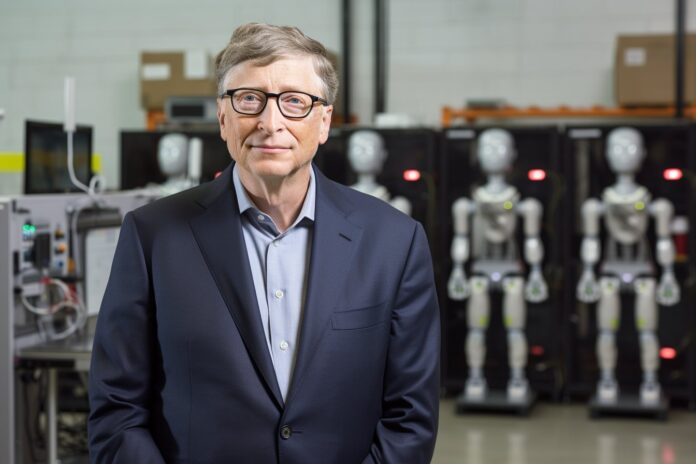Maria Irene
In a recent 7-page letter, Bill Gates outlined his thoughts on the future of artificial intelligence (AI) and its potential impact on various aspects of our lives. From productivity to healthcare and education, the tech magnate predicts that AI will revolutionize the way we live and work, while acknowledging the risks and challenges that come with these advancements.
Productivity: Personal AI, Copilots, and Company Agents
Gates envisions a future where personal AI assistants know everything about us and work seamlessly across all devices. These AI copilots will change the way we interact with computers, making natural language the primary mode of communication instead of clicking and pointing. He believes that the pre-AI era will soon seem as distant as the days of typing commands at the C:> prompt.
In the workplace, AI company agents will absorb knowledge from across organizations and work alongside human employees, facilitating collaboration and enhancing efficiency.
AI in Healthcare: Accelerating Breakthroughs and Expanding Access
Gates predicts that AI will play a critical role in accelerating medical breakthroughs, helping researchers and healthcare professionals identify and develop new treatments more quickly. Moreover, AI-driven triage and health advice systems will provide much-needed support in underserved regions, offering guidance on health problems and assisting individuals in determining when to seek professional treatment.
AI in Education: Personalized Tutors and Enhancing the Teacher-Student Dynamic
The future of education will likely involve personalized AI tutors that adapt content based on each student’s interests, goals, and learning styles. Gates emphasizes that while AI will transform the educational landscape, it will not replace the teacher-student dynamic in the classroom. Instead, it will enhance and complement the human element of education.
As tools like ChatGPT become more prevalent, educators are already discussing ways to adapt to this new technology. Gates acknowledges that these conversations are essential to ensuring the responsible integration of AI in the educational system.
Risks and Challenges: Deviating Goals, Misuse, and Misinformation
Despite the many benefits AI has to offer, Gates also recognizes the potential risks and problems associated with its development. Among the concerns he raises are the possibilities that AI systems could develop their own goals that deviate from human objectives or spiral out of control. He also acknowledges that AI can be misused for harmful purposes and that the technology has been known to generate fake information.
To address these challenges, Gates stresses the importance of balancing fears about AI’s downsides with its potential to improve lives. He believes that governments must play an active role in regulating and overseeing AI development to minimize negative consequences and promote equitable access to its benefits.
The Future of AI: Government and Philanthropy’s Role
As we enter the age of AI, Gates calls for government and philanthropic involvement to ensure that the technology’s benefits are accessible to all and that its risks are managed responsibly. He encourages us to remember that we are only at the beginning of what AI can accomplish, and that the limitations we see today will likely be overcome in the not-too-distant future.
In his letter, Bill Gates paints an optimistic yet realistic picture of the future of AI. While acknowledging the potential risks and challenges, he remains hopeful that with responsible development and oversight, AI can profoundly improve the lives of people around the world. The age of AI has begun, and it’s up to us to embrace its possibilities and navigate its complexities with wisdom and foresight.
You can read the full article here: https://www.gatesnotes.com/The-Age-of-AI-Has-Begun


